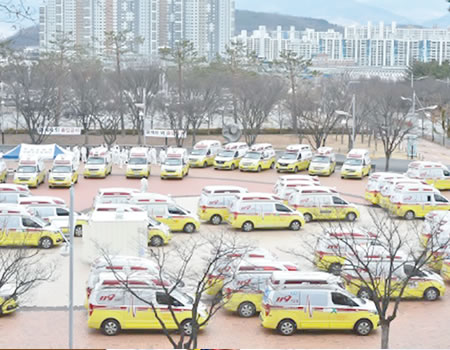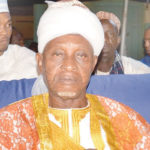With the apparent spread of the COVID-19 pandemic in Nigeria, as well as in many other parts of the world, one of the pressing challenges is the dwindling bed spaces for treatment of patients. With South Korea’s successful model at addressing this handicap, IFEDAYO OGUNYEMI, in this report, provides experts’ views including that of the Nigeria Center for Disease Control (NCDC) in adopting this model and the possible hiccups to be expected.
The novel coronavirus has continued to ravage every part of the world. In Nigeria, confirmed cases rose to 4,971 on May 13th, surpassing an April 5th prediction that estimated that the number of cases in Nigeria could reach 1,885 in May 2020 based on a 95% prediction interval.
One burden too much
The persistent increase in the number of confirmed cases is not a surprise to keen followers of the coronavirus pandemic in the country as Lagos which is the epicentre of the pandemic in the country continued to record new cases almost every day.
Another worrying development was the shutdown of COVID-19 testing in Kano State for some days. Even though testing has resumed in Nigeria’s largest city, it is believed that confirmed cases in the state will soar in the next couple of days following the spate of strange deaths recorded in the state.
Nigerian Tribune recalls that President Muhammadu Buhari while declaring lockdown in Kano State during his presidential address to Nigerians on Monday, April 27, relaxed same for Lagos and Ogun State and the Federal Capital Territory (FCT) Abuja that have been on lockdown since March 30th having been inundated by the untold hardship the lockdown has caused on the citizens of the country, President Buhari also declared a 8.00 pm to 6.00 am curfew across the country among other measures to contain the spread of the virus.

More cases, more handicaps
The increase in the number of recorded cases has burdened the nation’s health care system. There is now a growing concern that the 3,500-hospital beds dedicated for coronavirus in the country may not be enough as some states are already running out of bed spaces. The 4,971 cases already recorded in the country are already putting pressure on the available hospital beds in the country.
Confirming this new development, the Director-General of the Nigeria Centre for Disease Control (NCDC), Chikwe Ihekweazu, during a daily Presidential Task Force (PTF) briefing on COVID-19 recently said: “Concerning the availability of bed spaces for the management of patients, there is no doubt that we are struggling in certain places especially in Lagos State, and to an extent Kano and Abuja. Across the country, we have about 3,500 bed spaces identified as available for coronavirus but in Lagos, we are already struggling. So, we are going to work with them to keep trying to make more spaces available.”
But Nigeria is not alone in the shortage of resources to tackle the COVID-19 pandemic. In March, the United States was warned that it may run out of ventilators, from the UK, Spain, France, China, hotels have been converted to hospitals, to ease the shortage of hospital beds.
And so comes the South Korean template
However, in order to tackle this shortage, the South Korean government whose patients were initially dying while waiting for hospital beds turned things around when it devised a new strategy to refer only those with critical conditions to the hospital unlike when every COVID-19 patient were put in a negative pressure room so as to isolate infected patients while preventing contaminated air from escaping the room. With the former arrangement, Daegu’s hospitals were clogged with patients with mild symptoms as at the time its daily new cases exceeded 100 on February 23rd.
But the new strategy devised which came into force on March 1st divided the confirmed COVID-19 patients into four categories – mild, moderate, severe, and extremely severe – based on criteria set by the Korean Medical Association.
As highlighted on Korea CDC website, “mild patients (patients with mild symptoms) are placed in home quarantine (self-quarantine) or admitted to a Living Treatment Center and may later be transferred to a hospital if their symptoms aggravate. Moderate patients are admitted to hospitals with capacity to treat infectious disease patients. Severe or extremely severe patients are admitted to tertiary hospitals which have greater capacity for treatment. This system allows patients to receive the care they need in a timely manner.”
Those in any of the 16 Living Treatment Centers across the country were, however, not without government officials watching them. The strategy means that only about 10 medical staff are required for a 200-patient facility. Tensions which had arisen as a result of the hospital bed shortages melted into thin air.
Large suburban residential buildings, used by public enterprises or large private firms for education, training and short-term residence of their employees were converted into these Living Treatment Centres or dormitories and as of late March, Living Treatment Centers in operation in the country grew to 123 with 11,722 beds.
The patients placed in the LTC/dormitories are evaluated twice a day by a physician who checks their temperature and respiratory symptoms. Medical data such as electrocardiogram (ECG), blood pressure, oxygen saturation, heart rate, and breathing rate is acquired by vital sign monitors and transmitted in real time to the monitoring center.
As at 8 am on March 15, the Central Disaster Safety Response Headquarters said a total of 2,620 mild patients were admitted to 16 treatment centers from which 196 patients were released by the end of the day. Another 207 patients who tested negative for the virus were released from the centres the following day after being diagnosed twice in a row.
This strategy is somewhat similar to the position of the WHO-China Joint Mission in the report which stated that 80 percent of COVID-19 patients in China developed only mild symptoms and could be treated at home. The report also noted that only the remaining 20 per cent require hospitalisation.
The Daegu strategy was implemented country-wide and of the 10,991 confirmed cases in South Korea as of 06:34 GMT on May 14th, only 260 deaths have been recorded while at least 9,762 patients have recovered. The head of South Korea’s COVID-19 response team in Daegu, Min Pok-kee was quoted by the Wall Street Journal to have said: “We were fighting a war with very little time on our hands. If we had not secured these other facilities, our death rate would have resembled other countries.”
This strategy on bed shortages and others deployed on diagnostic testing, contact tracing, physical distancing and clinical care has earned South Korea accolades from the WHO.
A spokesperson for WHO’s Western Pacific Regional Office told Nigerian Tribune that other countries of the world should emulate South Korea and the steps taken to combat the spread of the virus.
Countries should combine measures to reduce, stop the spread of COVID-19—WHO
A statement sent to the Nigerian Tribune from the WHO’s Western Pacific Regional Office has it that: “The Republic of Korea combined fast, accessible and affordable diagnostic testing with very active contact tracing, physical distancing measures and protocols for clinical care. These actions and others have helped to slow the spread of coronavirus in the country.
“WHO’s advice is that countries should combine a number of measures to reduce and stop the spread of COVID-19, with an emphasis on finding, isolating and treating cases, and tracing and quarantining their contacts.
“Data show that the Republic of Korea has flattened its curve. However, every country must remain vigilant. Despite the fact that Korea’s new daily case numbers are mostly in single digits now, it is good to see the country is not letting down its guard and is maintaining vigilance.”

We are considering home care for asymptomatic or mild cases —NCDC
When the Nigerian Tribune contacted the NCDC to ascertain the new strategies the agency would devise to address the shortage of beds, the media aide to the NCDC DG, Emeka Oguanuo, while quoting Dr Ihekweazu said: “Since the beginning of the outbreak, countries have adopted diverse strategies to curb the spread of the disease. These strategies which are aimed at preventing, detecting, controlling and mitigating the impact of the pandemic, will yield varying results. This is a new virus and we are learning new things almost every day.
“Ultimately, in Nigeria, our strategy is to promptly detect and isolate confirmed cases, manage these cases to recovery and follow up with contacts to prevent the widespread of COVID-19 in Nigeria. We continue to implement strategies based on scientific evidence and taking our context and reality into consideration.
“As of May 2nd, we have successfully managed 385 cases to recovery. The Federal Ministry of Health continues to enhance capacity in this regard through assessment and accreditation of isolation centres identified in various states, both in private and public facilities.
“We are continuously reviewing our strategy and currently considering other options, including possible home care of asymptomatic or mild cases. We continue to learn as well as strengthen our capacity to respond as the situation evolves in Nigeria.”
Meanwhile, the Minister of Health, Osagie Ehanire, who also spoke during the PTF briefing on Thursday, April 30, appealed to Nigerians to donate their properties, especially hotels and make them available for use in cases of an emergency, adding that the country needs adequate facilities to isolate and treat infected persons.
It is good to get dormitories from individuals —NMA
In an interaction with the Nigerian Tribune, the national president of the Nigerian Medical Association, Dr Francis Faduyile, confirmed that the government is already implementing home care for some of the patients.
“What Nigeria is doing presently is getting treatment for patients in the home. If they are working on getting dormitories so they can treat those who are mild and moderate there, it is okay.
“I am not directly at the treatment centre, but they have changed tactics because those that are mild and moderate are being treated at home or other places. They don’t need to stay at the isolation centres. That is the new thing that is being done. They started about a week ago.
“Even to get these places you can call dormitories, you need people who are ready to donate them for use.”
‘Home care may result into stigmatisation’
A former national secretary of the NMA, Dr Adewunmi Alayaki, told Nigerian Tribune that the South Korean strategy can be adopted. He, however, expressed concerns that the people might not make it work as it should.
Alayaki said: “There is nothing that cannot be done if there’s the will of the government and the patients. The probing question is that, do we have the will to do something of such?
“Are the patients ready to comply with such directives pending the time they are certified okay? Will they not entertain visitors at these dormitories or run away from the dormitories? We can categorise them according to the cases – asymptomatic, mild, moderate, severe and most severe. And if we have different facilities, we can use to house them, we can provide security there.”
When asked if homecare can be sought as an alternative strategy, the former Ogun NMA chairman expressed the same concerns amidst new others.
He said: “On home care, stigmatisation is my first concern. After the patient is well, will people be willing to visit the house of such a patient when the issue of coronavirus is over? If we want to try homecare, will the immediate family, relatives and neighbours not contract the virus if they don’t have strong immunity? Who will provide food tor them at home and how will they be attended to?”
Another expert, the Medical Director of the Federal Polytechnic, Ilaro, Dr Babatunde Jesusina, said: “That is a model that can work well for Nigeria. That is a feasible model any right-thinking model can adopt.
“When you compare the confirmed cases with those discharged and those who died, not all of them can be treated at the hospitals; there is a wide difference between them. Not all of these cases were admitted. We can work on hospitalising only those with severe symptoms while those with moderate or mild symptoms can be treated elsewhere.”
YOU SHOULD NOT MISS THESE HEADLINES FROM NIGERIAN TRIBUNE
Buy and read digital replicas of your TRIBUNE titles by subscribing through E-VENDING
COVID-19: 950 More Nigerian Children Under Five Could Die Daily Without Urgent Action ― UNICEF
It has been observed that unless urgent actions are taken, an additional 950 Nigerian children, mostly under-five years, could die daily from preventable causes over the next six months as the COVID-19 pandemic disrupts routine services and threatens to weaken the health system… Read full story
WHO Warns Coronavirus May Never Go Away As Toll Nears 300,000
The coronavirus may never go away and populations will have to learn to live with it just as they have HIV, the World Health Organization has warned, as the global death toll from the disease nears 300,000. There were also gloomy forecasts from the US Federal Reserve, which said prolonged shutdowns to stem… Read full story
COVID-19: When Eye Glasses Become Important
SCIENTISTS are still deep in the research process of uncovering all the ways in which COVID-19 can be transmitted. Now, in a new study, researchers at the University of Hong Kong have found eyes are ‘important route’ for coronavirus. The findings are challenging the widely held assumption in the earliest stages of the… Read full story
Why We Rejected Zoom Meeting With FG —ASUU President
The president of the Academic Staff Union of Universities, Professor Biodun Ogunyemi, has explained why the union refused to hold meeting via Zoom platform with the Federal Government’s representatives, saying such meeting would not yield any tangible result as it would be difficult to control… Read full story
How 13 Members Of Crime Group, Shila Boys, Landed In Adamawa Police Net
Thirteen members of a crime group in Adamawa State known as Shila Boys were on Wednesday, May 13, paraded after they were arrested for attacking residents of the state. The newly-established Task Force to fight against crime in the state arrested the 13 members and recovered weapons as well as tricycles… Read full story
Why FG Should Stop Working Against Domestic Airlines
If there is anything that is standing for the governments in places like America, Europe, Asia and Middle East and other developed nations of the world, that thing is patriotism and the over protectionism policy of the governments of these nations when it comes to their own things… Read full story
Six Opposition Party Members Arrested For Distributing Face Masks In Cameroon Market
Six members of Cameroon’s opposition party, the Cameroon Renaissance Movement (MRC), have been arrested for distributing face masks and hand sanitisers in the capital, Yaoundé. The six men were picked up at the Mokolo market, one of the largest in the country… Read full story
Pandemics In History: Was Nigeria Prepared For Covid-19? (2)
LAST week, some patients who had been isolated from the rest of society on account of coronavirus infection in Gombe State reportedly vacated the Federal Teaching Hospital in Gombe, the state capital, to protest the poor state of facilities and treatment. Earlier, patients in the Kwadom Infectious Disease Hospital in the… Read full story
COVID-19 Isn’t Just A Respiratory Disease, It Affects The Whole Body
The patient had been relatively fine for the first 10 days he was down with COVID-19. Just 38, he didn’t fit the description of people at high risk of complications from the new coronavirus. “He had mild pulmonary symptoms that he was just sitting at home with,” said Dr Sean Wengerter, a vascular surgeon in Pomona… Read full story
EDITORIAL: The Protests By Covid-19 Patients In Gombe
LAST week, some patients who had been isolated from the rest of society on account of coronavirus infection in Gombe State reportedly vacated the Federal Teaching Hospital in Gombe, the state capital, to protest the poor state of facilities and treatment. Earlier, patients in the Kwadom Infectious Disease Hospital in the… Read full story
How Children Were Separated During Playtime In ‘Chalk Isolation Boxes’ As Schools Resume In France
Some heart-breaking photographs of nursery school children forced to play in ‘isolation sections’ in French schools have caused shock and outrage, the Daily Mail of UK has reported. The photos, taken in the town of Tourcoing on the border with Belgium, show boys and girls forced to stay away from each other inside areas… Read full story
Ooni Of Ife To Partner Afe Babalola Varsity To Produce Drugs, Vaccines For Coronavirus, Others
The Ooni of Ife, Oba Enitan Ogunwusi, has concluded plans to partner with Afe Babalola University Ado-Ekiti (ABUAD) on a clinical research aimed at developing drugs and vaccines for viral infections with special focus on coronavirus pandemic… Read full story
WATCH TOP VIDEOS FROM NIGERIAN TRIBUNE TV
- Let’s Talk About SELF-AWARENESS
- Is Your Confidence Mistaken for Pride? Let’s talk about it
- Is Etiquette About Perfection…Or Just Not Being Rude?
- Top Psychologist Reveal 3 Signs You’re Struggling With Imposter Syndrome
- Do You Pick Up Work-Related Calls at Midnight or Never? Let’s Talk About Boundaries






